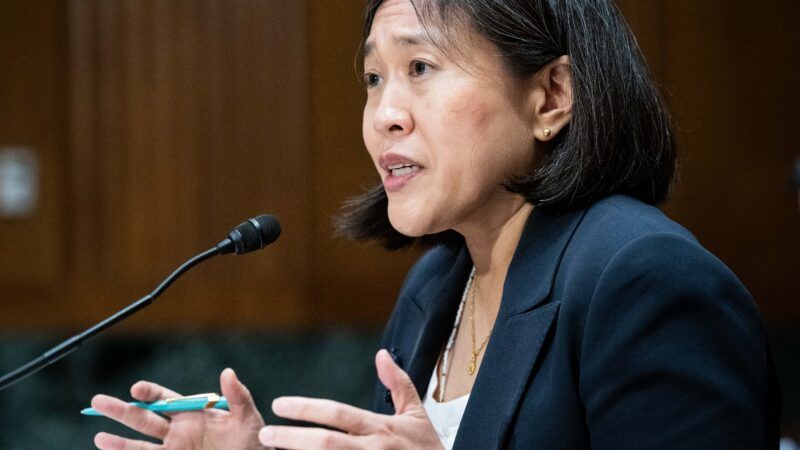Biden's Top Trade Official Just Admitted Tariffs Haven't Changed China's Behavior
Katherine Tai said tariffs were "leverage" against China, but now she admits that China hasn't made "any changes to its fundamental systemic structural policies."

While campaigning for the presidency in 2020, Joe Biden criticized then-President Donald Trump's decision to slap tariffs on a wide range of goods imported from China. Once getting into the White House, however, Biden has maintained those tariffs—and even added to them.
Asked in 2022 about that apparent contradiction, Biden's top trade official said the administration was unwilling to draw down Trump's tariffs because they were crucial "leverage" that could be applied to China.
"The China tariffs are, in my view, a significant piece of leverage—and a trade negotiator never walks away from leverage," U.S. Trade Representative Katherine Tai said at that time. The Biden administration, she added, was seeking to turn that "leverage into a strategic program that will strengthen American competitiveness and defend our interests in a global economy in which China will continue to play."
More than two years later, and nearly four years after Biden took office, what has that supposed leverage accomplished? Tai provided the answer to that question this week during an interview with Bloomberg.
"We really haven't seen the [People's Republic of China] make any changes to its fundamental systemic structural policies that would make sense for us to provide any relaxation," Tai told reporter Eric Martin for his Supply Lines newsletter.
In fact, Tai noted that there aren't any ongoing negotiations between the U.S. and China right now—but don't worry, she's still insistent that the tariffs are useful for…something. "At the moment we are not negotiating anything with the PRC on trade," she told Martin, "but one day we may be back at the table, in which case these tariffs will be useful as leverage, right?"
In summary, Tai's position seems to be that American businesses and families must continue bearing the cost of the Trump-Biden tariffs even though those tariffs have plainly failed to achieve their primary policy goal (changing China's behavior) because there's a chance that someday, somehow, that might make a difference.
This is superstition masquerading as thoughtful policy making. Tai is acknowledging that the benefits of the tariffs are entirely hypothetical—but, of course, the costs are very real! The Section 301 tariffs on Chinese imports cost American consumers and businesses more than $200 billion in higher taxes from the start of Trump's trade war through March 2024, according to calculations by the Tax Foundation.
Tai's admission that the tariffs haven't worked is at least a brief moment of economic clarity. It's also one supported by data. Trump originally promised that his tariffs would cause "thousands of companies" to leave China, but researchers at the University of Kansas and the University of California, Irvine, found that the overall number of multinational firms operating in China actually increased during 2019, the first full year of Trump's trade war.
Additionally, the promises that China's government made as part of the so-called Phase One trade deal Trump inked in 2020 never materialized. For those keeping score at home: Tariffs also did not grow the economy, did not reduce America's trade deficit, and did not boost manufacturing jobs.
When the Biden administration inherited Trump's trade war, it promised more competent management—but delivered a continuation of the status quo as tariffs slowed America's response to the COVID-19 pandemic and pushed prices higher in the year after the pandemic ebbed. It wasn't new management that was needed, but a new approach to the flawed idea that tariffs can be useful for anything besides generating revenue from taxes paid by Americans.
Tariffs don't work as trade leverage, as even Tai is now admitting. That was true when Trump was president, it was true while Biden was president, and it will be true if Vice President Kamala Harris—who says there is not a single thing she would change from the Biden administration—gets a chance to run the show next year.


Show Comments (70)